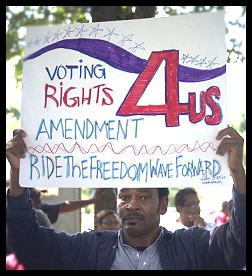 Given the pivotal role Florida and its 29 electoral votes have played in recent Presidential elections, November's midterms could prove to be pivotal in the state, and not only for Florida. November 6th, 2018 could prove to be a landmark moment for democracy, helping to determine the outcome of the 2020 Presidential election.
Given the pivotal role Florida and its 29 electoral votes have played in recent Presidential elections, November's midterms could prove to be pivotal in the state, and not only for Florida. November 6th, 2018 could prove to be a landmark moment for democracy, helping to determine the outcome of the 2020 Presidential election.
The combination of a win by Democratic Gubernatorial Candidate Andrew Gillum, along with passage of the state's Amendment 4, could be a death knell to right wing voter suppression schemes which have long plagued the Sunshine State.
Amendment 4 is a ballot measure "designed to automatically restore the right to vote for people with prior felony convictions, except those convicted of murder or a felony sexual offense, upon completing of their sentences including prison, parole and probation". As observed by the Intercept's Rachel Cohen, Florida's "draconian" felony disenfranchisement law --- "passed in 1868, after an unsuccessful attempt by Florida and other [former Confederate] states to reject the 15th amendment" --- has served to disenfranchise "more than 20% of otherwise eligible black voters in Florida."
If adopted by voters next month, the new Constitutional measure would automatically "restore voting rights to an estimated 1.5 million Floridians who have fully completed sentences," Cohen reports. If added to the 13 million currently registered Floridian voters, Amendment 4 could potentially increase total voter rolls by more than 10%.
Only 3% of African-Americans identify themselves as Republicans. Thus, it doesn't take a rocket scientist to calculate the potential impact of increasing, by 20%, the number of black Florida voters who would be eligible to vote in 2020.
But, felony convictions are not the only means by which Republicans have sought to suppress turnout of the "wrong" voters over the past two decades during which the GOP has occupied the Governor's mansion and exercised the Chief Executive's right to appoint Florida's Secretaries of State...
FL GOP voter suppression
There can be no greater example of the combined impact of Florida's felony disenfranchisement law and GOP voter suppression tactics than the pivotal 2000 Presidential election. According to the official count, announced by Republican Secretary of State Katherine Harris, George W. Bush won the state of Florida and, with it, the presidency by 537 votes. Harris had previously been appointed to serve as Florida's Secretary of State by Dubya's Republican brother, Governor Jeb Bush.
As reported by investigative reporter Greg Palast in 2006's Armed Madhouse, in the months leading up to the November 2000 election, Harris teamed with a computer company to compile a list of 94,000 "felons" who were then purged from Florida's eligible voter rolls. "At least 91,000," Palast proclaimed, "were innocent legal voters but the vast majority of those were guilty of nothing more than being Black, Democrat or both." The rolls were purged of innocents based on nothing more than name similarity.
In his more recent work, Palast exposed how the 2000 Florida voter purge evolved into "Crosscheck", a GOP interstate computerized voter suppression scheme designed to encourging the purging of millions of otherwise eligible voters from the rolls in dozens of states.
Elected in 2010, Florida Republican Governor Rick Scott, together with his hand-picked Secretary of State Ken Detzner, embarked upon what Scott's then-Republican predecessor, Gov. Charlie Crist described as a "shameless," "mean-spirited," "insidious" and "sweeping" effort to gain advantage "under the guise of removing non-citizens" from Florida's eligible voter rolls. Scott and Detzner targeted some 182,000 "potential non-citizens" whom they had hoped to purge from the rolls.
Following extensive litigation, Scott and Detzner reduced their claim to just 107 non-citizens --- a mere fraction of the original 182,000. But, as The BRAD BLOG reported in 2012, following its own independent investigation, even that significantly reduced number --- 107 out of 11.2 million registered voters --- was an exaggeration.
At the time we found that:
Despite the epic failure of their "potential" non-citizen voter purge, which led to an uprising even by Republican county election officials, Scott's and Detzner's voter suppression efforts continued, as did adverse court decisions.
In 2016, a U.S. District Court judge blocked a scheme the two had devised to reject absentee ballots. The court described the plan as "illogical", "bizarre" and "obscene".
Earlier this year, U.S. District Court Judge Mark Walker found "a stark pattern of [age] discrimination" in Scott and Detzner's effort to block early on-campus voting. (Younger voters, along with an influx of displaced Puerto Ricans after Hurricane Maria, have been credited as a source of a potential Democratic wave in Florida). The court ordered Detzner to inform all 67 counties that they could, despite his earlier blockade, use university and college campus buildings for early voting this fall.
A change a comin'?
Perhaps.
Polls appear favorable on Amendment 4. In order to pass, the state constitutional amendment must garner 60% of the vote. According to a recent University of North Florida poll, 71% of Florida voters support Amendment 4. In the Governor's race, polls are much tighter. Nonetheless, Gillum has led Republican nominee Ron DeSantis in every poll taken since August. In polls taken between Sept. 13 and the end of the month, the latest currently available, Gillum leads by a RealClearPolitics average of 3.7%, with the race now considered to be a "toss up".
While favorable polls do not necessarily equate to favorable results, one thing can be said with relative certainty. Combined victories for Gillum and Amendment 4 could have a significantly positive impact on the health of Florida's representative democracy --- a change that could end with an award of Florida's 29 electoral votes in 2020 based upon the will of the electorate, as opposed to the manipulations of GOP vote suppressors.
 Ernest A. Canning is a retired attorney, author, Vietnam Veteran (4th Infantry, Central Highlands 1968) and a Senior Advisor to Veterans For Bernie. He has been a member of the California state bar since 1977. In addition to a juris doctor, he has received both undergraduate and graduate degrees in political science. Follow him on twitter: @cann4ing
Ernest A. Canning is a retired attorney, author, Vietnam Veteran (4th Infantry, Central Highlands 1968) and a Senior Advisor to Veterans For Bernie. He has been a member of the California state bar since 1977. In addition to a juris doctor, he has received both undergraduate and graduate degrees in political science. Follow him on twitter: @cann4ing


 'Green News Report' 12/17/24
'Green News Report' 12/17/24
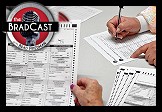 Mistallied Contests Found in OH County, as Oligarchy Rises in D.C.: 'BradCast' 12/16/24
Mistallied Contests Found in OH County, as Oligarchy Rises in D.C.: 'BradCast' 12/16/24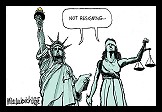 Sunday 'Barrel Bottom' Toons
Sunday 'Barrel Bottom' Toons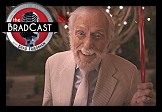 Trump Admits He Can't Lower Grocery Prices (Biden Just Did): 'BradCast' 12/12/24
Trump Admits He Can't Lower Grocery Prices (Biden Just Did): 'BradCast' 12/12/24 'Green News Report' 12/12/24
'Green News Report' 12/12/24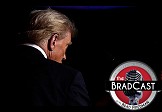 What 'Unprecedented and Powerful Mandate'?: 'BradCast' 12/11/24
What 'Unprecedented and Powerful Mandate'?: 'BradCast' 12/11/24 Trump Barely Won Nationally, But Won 'News Deserts' By a Landslide: 'BradCast' 12/10
Trump Barely Won Nationally, But Won 'News Deserts' By a Landslide: 'BradCast' 12/10 'Green News Report' 12/10/24
'Green News Report' 12/10/24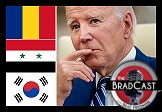 Bad Weekend for Authorit-arianism; Also: To Pardon or Not?: 'BradCast' 12/9/24
Bad Weekend for Authorit-arianism; Also: To Pardon or Not?: 'BradCast' 12/9/24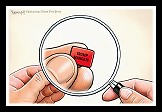 Sunday 'Teeny Tiny' Toons
Sunday 'Teeny Tiny' Toons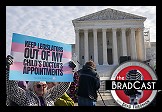 Fox 'News' and GOP Get Their Hateful War on Trans Kids at SCOTUS: 'BradCast' 12/5/24
Fox 'News' and GOP Get Their Hateful War on Trans Kids at SCOTUS: 'BradCast' 12/5/24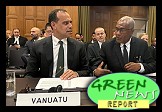 'Green News Report' 12/5/24
'Green News Report' 12/5/24 'Mind Boggles at Potential Corruption' in Trump Scheme: 'BradCast' 12/4/24
'Mind Boggles at Potential Corruption' in Trump Scheme: 'BradCast' 12/4/24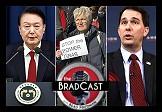 In Defense of Democracy from S. Korea to N. Carolina: 'BradCast' 12/3/24
In Defense of Democracy from S. Korea to N. Carolina: 'BradCast' 12/3/24 Hunter's Pardon: 'BradCast' 12/2/24
Hunter's Pardon: 'BradCast' 12/2/24 How (and Why!) to 'Extend Olive Branch' to MAGA Members: 'BradCast' 11/21/24
How (and Why!) to 'Extend Olive Branch' to MAGA Members: 'BradCast' 11/21/24 Former Prosecutor: Sentence Trump in NY Before Taking Office: 'BradCast' 11/20/24
Former Prosecutor: Sentence Trump in NY Before Taking Office: 'BradCast' 11/20/24 'Bullet Ballot' Claims, Other Arguments for Hand-Counting 2024: 'BradCast' 11/19/24
'Bullet Ballot' Claims, Other Arguments for Hand-Counting 2024: 'BradCast' 11/19/24 Trump Already Violating Law During Transition: 'BradCast' 11/18/24
Trump Already Violating Law During Transition: 'BradCast' 11/18/24 Computer Experts Ask Harris to Seek Hand-Counts After Breaches: 'BradCast' 11/14/24
Computer Experts Ask Harris to Seek Hand-Counts After Breaches: 'BradCast' 11/14/24
 VA GOP VOTER REG FRAUDSTER OFF HOOK
VA GOP VOTER REG FRAUDSTER OFF HOOK Criminal GOP Voter Registration Fraud Probe Expanding in VA
Criminal GOP Voter Registration Fraud Probe Expanding in VA DOJ PROBE SOUGHT AFTER VA ARREST
DOJ PROBE SOUGHT AFTER VA ARREST Arrest in VA: GOP Voter Reg Scandal Widens
Arrest in VA: GOP Voter Reg Scandal Widens ALL TOGETHER: ROVE, SPROUL, KOCHS, RNC
ALL TOGETHER: ROVE, SPROUL, KOCHS, RNC LATimes: RNC's 'Fired' Sproul Working for Repubs in 'as Many as 30 States'
LATimes: RNC's 'Fired' Sproul Working for Repubs in 'as Many as 30 States' 'Fired' Sproul Group 'Cloned', Still Working for Republicans in At Least 10 States
'Fired' Sproul Group 'Cloned', Still Working for Republicans in At Least 10 States FINALLY: FOX ON GOP REG FRAUD SCANDAL
FINALLY: FOX ON GOP REG FRAUD SCANDAL COLORADO FOLLOWS FLORIDA WITH GOP CRIMINAL INVESTIGATION
COLORADO FOLLOWS FLORIDA WITH GOP CRIMINAL INVESTIGATION CRIMINAL PROBE LAUNCHED INTO GOP VOTER REGISTRATION FRAUD SCANDAL IN FL
CRIMINAL PROBE LAUNCHED INTO GOP VOTER REGISTRATION FRAUD SCANDAL IN FL Brad Breaks PA Photo ID & GOP Registration Fraud Scandal News on Hartmann TV
Brad Breaks PA Photo ID & GOP Registration Fraud Scandal News on Hartmann TV  CAUGHT ON TAPE: COORDINATED NATIONWIDE GOP VOTER REG SCAM
CAUGHT ON TAPE: COORDINATED NATIONWIDE GOP VOTER REG SCAM CRIMINAL ELECTION FRAUD COMPLAINT FILED AGAINST GOP 'FRAUD' FIRM
CRIMINAL ELECTION FRAUD COMPLAINT FILED AGAINST GOP 'FRAUD' FIRM RICK SCOTT GETS ROLLED IN GOP REGISTRATION FRAUD SCANDAL
RICK SCOTT GETS ROLLED IN GOP REGISTRATION FRAUD SCANDAL VIDEO: Brad Breaks GOP Reg Fraud Scandal on Hartmann TV
VIDEO: Brad Breaks GOP Reg Fraud Scandal on Hartmann TV RNC FIRES NATIONAL VOTER REGISTRATION FIRM FOR FRAUD
RNC FIRES NATIONAL VOTER REGISTRATION FIRM FOR FRAUD EXCLUSIVE: Intvw w/ FL Official Who First Discovered GOP Reg Fraud
EXCLUSIVE: Intvw w/ FL Official Who First Discovered GOP Reg Fraud GOP REGISTRATION FRAUD FOUND IN FL
GOP REGISTRATION FRAUD FOUND IN FL


































